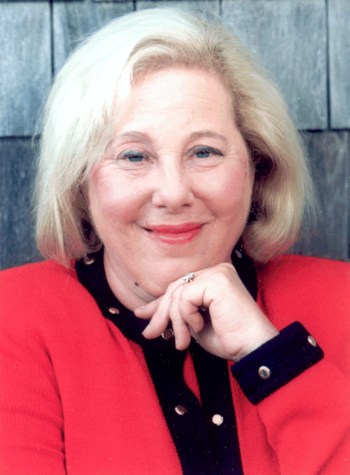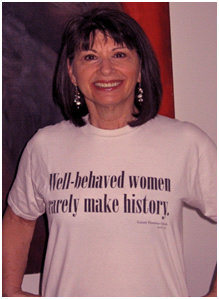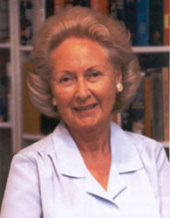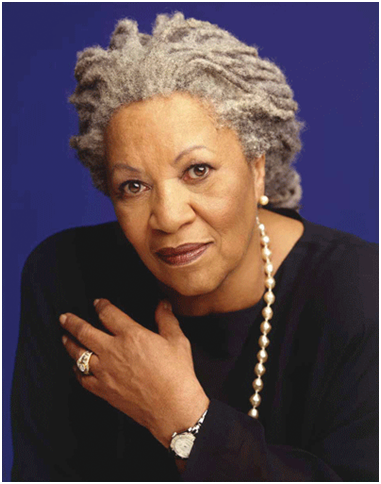Connect with Gloria!
Bring Gloria to Speak
Featured Upcoming Event
Wednesday, Oct. 2-Nov. 13, 2013 Gloria will teach a 6-week online course "9 Practical Leadership Power Tools to Advance Your Career". This is a Take The Lead event in partnership with Arizona State University Online. Participants will receive a certificate to enhance their resumes along with practical skills and understanding of power dynamics in the workplace. Don't miss this opportunity and register today!
More events here.
Buy Gloria’s Latest Book
-
-
-
Accolades

"With heartfelt encouragement ... (including strategies for including men in feminist causes), this guide is accessible to all."
~Publisher's Weekly
 "Female Writers Kicking Up Literary Dust"
"Female Writers Kicking Up Literary Dust"
~Women's e-News"Top 30 Political Mom Bloggers"
~The Stir"Gift Ideas for the Change Agents on Your List"
~Claire Mysko"Feminist Reading List"
~Deep Muck Big Rake"5 Must-Read Books for Women"
~Hello LadiesRead additional Media Buzz here.
-
Recent Posts
Recent Comments
- Gloria Feldt; An Inspiring Woman » CreativeBizHub on She’s Doing It: LisaBeth Weber Pins Pack Message Wallop
- Gloria Feldt on Stuck? Meet Jake and the Power of Letting Go to Move Forward
- Leslie on Stuck? Meet Jake and the Power of Letting Go to Move Forward
- Liz @ Creative Liberty on Sandberg: Are You Bossy or Merely Showing Leadership Skills?
- Gloria Feldt on Sandberg: Are You Bossy or Merely Showing Leadership Skills?
Categories
Listen to My Podcasts

Stacey Gualandi of The Women's Eye interviewed me about--what else--women and power.
Shelley Irwin of NPR asks me why I believe that no one is holding women back but themselves.
Suzanne Braun Levine and I discuss No Excuses on The Fiesty Side of Fifty on Blog Talk Radio.
Nicole Sanders talks to me about No Excuses on her show Radio or Not, on Progressive Talk Radio.
Dennis Lambert of KJZZ's "Morning Edition asks me why I wrote No Excuses.
Talking to Terry Hernon MacDonald about No Excuses over at Single Women Rule.
Discussing No Excuses with Joe Conason on Book Talk Radio.
Talking with Amanda Marcotte on RH Reality Check about women and power.
See Jane Do interview, encouraging women to step into positions of power and leadership – now!
Speaking with MadamaAmbi about No Excuses
Women's Relationship to Power and Leadership
Know Your HistoryWomen’s History Month: How Rosabeth Moss Kanter Led the Way for Women in the Workforceby Gloria Feldt on March 25th, 2013in Define Your Own Terms, Know Your History, Leadership, Power, Power Tools, She's Doing It I remember how excited I was to discover Rosabeth Moss Kanter in the early 1980’s. She was one of the few females writing about leadership and organizational change management. I hungrily devoured The Change Masters as a relatively new nonprofit CEO navigating roiling changes in the healthcare and political landscape while learning to lead a complex organization toward continued growth. This distinguished Harvard Business School professor’s influential theories about change in the workforce have permeated much of the thinking about organizational change. And unlike the men writing and teaching about it, Kanter infused her work with a lens on one of the biggest workplace changes of the 20th century: women breaking through workplace glass ceilings. Kanter, former editor of Harvard Business Review and author of 18 books, has been named one of the “50 most powerful women in the world” by the Times of London, and the “50 most influential business thinkers in the world” by Accenture and Thinkers 50 research. Her groundbreaking book Men and Women of the Corporation—I mean, who had ever mentioned “women” and “corporations” in the same book title?—remains a classic analysis of power distribution within organizations. Kanter told the hard truth about women in the workforce, after conducting a five-year study on the American manufacturing company. She explained how women were tokenized to work in clerical jobs rather than management; and how even though there were plenty of women in large organizations, they rarely ran the show. She observed that the first women breaking through to leadership roles were still tokens in a male dominated workforce. Read the full article...{ Comments Off on Women’s History Month: How Rosabeth Moss Kanter Led the Way for Women in the Workforce comments }
Images of Gender Equality Aspirations and Achievementsby Gloria Feldt on March 6th, 2013in Inspiration, Know Your History, Leadership, Power, Power Tools The UN Commission on the Status of Women has New York hopping with powerful and, yes, ambitious female leaders from around the world this week. Each is making women’s history in her own way. Today, I share just a few images of events I’m attending. Are you attending? If so, please share your impressions. 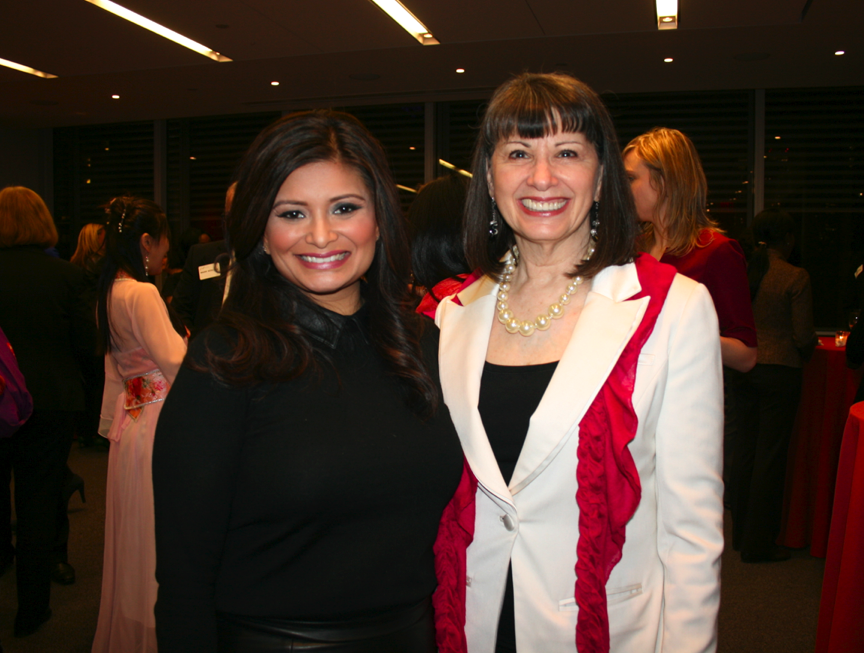 Television anchor and entrepreneur Joya Dass and I celebrated the launch of IMPACT 21 Leadership with its founder Janet Salazar. Joy and I both participated in a lively panel discussion of women’s emerging power globally and locally. { Comments Off on Images of Gender Equality Aspirations and Achievements comments }
Marissa Mayer: How to Make the Wrong Kind of History in Two Easy Lessonsby Gloria Feldt on March 4th, 2013in Know Your History, Leadership, Power, Power Tools, Uncategorized It’s March—Women’s History Month. I look forward to highlighting outstanding women each year. I was especially eager to profile Marissa Mayer this year. Mayer made history in July 2012 when she became the first woman CEO of Yahoo! and the first woman chosen to head a Fortune 500 company while pregnant. But unfortunately, lately she’s made history in the negative. The strides she made in her own career could soon be overshadowed by steps backward she’s made for other women—and men too, as it turns out. The first sign trouble was brewing in paradise came even as Mayer was being lauded for bursting through the silicone barrier while demonstrating women have both brains and uteri. Apparently she forgot a few chapters of her own history when she said in the recent PBS “Makers” interview:
Umm, how does a female a CEO of a Fortune 500 company think she became one? And even if she doesn’t want to throw a nod to the feminist movement that opened doors for her, is she completely oblivious to any female “first’s” responsibility to help other women advance? Read the full article...{ Comments Off on Marissa Mayer: How to Make the Wrong Kind of History in Two Easy Lessons comments }
I’m Doing It: 6 New Speeches for Women’s History Month March 2013by Gloria Feldt on January 2nd, 2013in Know Your History, Leadership, Power Tools, She's Doing It, Wear the Shirt Happy New Year! Time to pull out that spanking new calendar and start filling in 2013’s highlights. Women’s History Month—March—is always a big highlight for me. I blog almost every day. Or when I’m smart, I recruit fabulous guest posters, like Liz O’Donnell and Deborah Siegel. Why? Let’s face it—history has largely been defined through the male lens, recorded by male pens, with men as the main protagonists, and women, if noticed at all, in supporting roles. As the saying goes, you can’t be what you can’t see. The converse—you can aspire to that which you can imagine—is why I created six new speeches for Women’s History Month, March 2013. I had fun cooking up these new ideas to make women’s history interesting, relevant, and inspiring to corporate, professional, civic, college, and nonprofit groups of all kinds:
All my presentations are customized to address the group’s goals, and they can be delivered as keynotes or accompanied by a 9 Ways Leadership Power Tool Workshop. Last fall, I taught my Arizona Sate University course “Women, Power, and Leadership” online for the first time. I had a chance to learn webinar skills. If you are interested in exploring a digital version of one of these speeches, we can talk about that option. { Comments Off on I’m Doing It: 6 New Speeches for Women’s History Month March 2013 comments }
Interview: How to Be Self-Consciousby Gloria Feldt on July 27th, 2012in Know Your History, Leadership, No Excuses, Power Tools, Use What You've Got
Her most recent book, No Excuses, examines women’s relationship to power with an honesty and nuance often glossed over in media discussions. We talked with her about the current state of reproductive freedom in America and how women can transform their relationship with power. Women in the World Foundation: What led you to this issue of women and power? Gloria Feldt: In 2008, I was writing an article for Elle magazine about the many organizations that help women run for office. They are legion, and they raise millions of dollars, but women are still less than half as likely to even think about running for office as men. What I found was that the problem is no longer that women have a hard time running: the doors are open. Voters trust women more, women are now as capable of raising money, and when they do run, they are just as likely to win. But not enough of them are running, Read the full article...{ Comments Off on Interview: How to Be Self-Conscious comments }
She’s Doing It: Dorothy Seymour Mills Finds Her Voice–and Uses It!by Gloria Feldt on June 27th, 2012in Inspiration, Know Your History, Leadership, Power Tools, She's Doing It
In researching women’s baseball history, I discovered that at least two female baseball players had been signed to minor-league contracts but didn’t play. That’s because the Commissioner of Baseball, Kenesaw M. Landis, canceled their contracts as soon as he learned that they were women. Landis scoffed at the idea that women could play baseball, just as some baseball men do today. Read the full article...{ Comments Off on She’s Doing It: Dorothy Seymour Mills Finds Her Voice–and Uses It! comments }
Flourish Over 50: Gloria and Susan Tolles Talk Texas Pasts and Flourishing Futuresby Gloria Feldt on June 22nd, 2012in Employ Every Medium, Know Your History, Leadership, No Excuses, She's Doing It
SUSAN TOLLES: Welcome to Flourish Over 50. I’m just so excited that you’re here, and I want to talk about your lifelong passion for really empowering women. GLORIA FELDT: I first had to empower myself. I didn’t start out knowing much about this power stuff. I grew up in small towns in Texas in the 1940-50s, where girls were not encouraged to get an education, have a career, or have real aspirations for themselves. I mean, my family actually did expect me to get educated, but only in order to be a better mother, a better mate, etc. So I really didn’t start out thinking that I had power and agency myself; I grew thinking that the agency was outside of myself. I had to learn by trial-and-error along the way, and I am still learning it. SUSAN TOLLES: Right, we all are. It’s always a work in progress. GLORIA FELDT: It is a work in progress. So I’ll give you the real quick rundown of what happened: I was a teen mom; I got pregnant, married my high school sweetheart when I was 15. I had three children, bing-bing-bing, and then I was 20 years old. I think it was the combination of maturity and the advent of the birth control pill where I just woke up. That was one defining moment. I realized two things: Firstly, I had three children, and although I had a husband who was earning a salary, I kept thinking, “What if I have to support these children?” I had no employable skills whatsoever. Secondly, I was starting to get a little bored and I realized that this life was not as much fun as I thought it was going to be. I, in fact, had a brain and I was eager to go to school. And so, I finished high school by correspondence, and then the birth control pill came along. It was that defining moment that allowed me to see that I could create a life for myself. I could plan. If I wanted to have more children, I could have them by my own choice at whatever time I wanted to. But if I didn’t want to have more, then I had that option, and it meant I could go to college. I would say that was the first big defining moment for me. There were a series of other moments. So I often ask people when I speak, “When did you know you had the power to _______?” SUSAN TOLLES: Hmm, great question. Read the full article...{ 1 comments }
She’s Done It for 40 Years: Ms. Magazine Honored for Auspicious Anniversaryby Gloria Feldt on June 13th, 2012in Know Your History, Leadership, Power Tools, She's Doing It When did you first see Ms. Magazine? I can’t recall exactly the first time I saw it, but I do remember subscribing to it soon after it launched in 1972. I lived in Odessa TX, not exactly the bastion of feminism. But within the pages of Ms., I found women from all over the country saying what I’d been thinking. And I realized I wasn’t alone in feeling that something was terribly unfair about the way women were treated in society. I also learned about the National Organization for Women from Ms. I joined as an at-large member and located the other five or six at-large members within a 100-mile radius. { Comments Off on She’s Done It for 40 Years: Ms. Magazine Honored for Auspicious Anniversary comments }
Who Will the Woman of Tomorrow Be?by Gloria Feldt on March 26th, 2012in 9 Ways Blog, Know Your History, Leadership, Power Tools, Use What You've Got “What do you want to be?” we ask our daughters and sons when they are growing up. This article on Canadian women’s economic power indicates economic parity is on the way. A new study published in the Harvard Business Review says women are better leaders than men on almost every measure of leadership. But does that translate to women moving from the current 18% to parity in top leadership positions? Since the power to define the woman of tomorrow is to a large extent in our hands (See Power Tool #3) and based upon the history we make today (see power tool #1), I’m asking what you think: Read the full article...{ Comments Off on Who Will the Woman of Tomorrow Be? comments }
“Black Woman Novelist” -Toni Morrison Defines Her Own Termsby Catherine Engh on March 23rd, 2012in 9 Ways Blog, Inspiration, Know Your History, Leadership, No Excuses, Power Tools
It’s Women’s History Month and I can’t resist profiling Toni Morrison, a prolific writer who has worked to represent through fiction the experience of black people—particularly women–in America. Ms. Morrison’s novels focus on marginalized characters struggling to find their place in a society built upon the legacy of slavery and the violence of racial prejudice. Most known for her imaginative fiction, Morrison has also written essays, non-fiction, plays, a libretti, and children’s books. Ms. Morrison developed her first novel, The Bluest Eye (1970), while raising two children and teaching at Howard University. She later took a job as an editor at Random House, where she played a vital role in bringing black literature into the mainstream, editing books by authors such as Toni Cade Bambara, Angela Davis, and Gayl Jones. Commercially successful and critically acclaimed, her 1987 Pulitzer Prize winning novel “Beloved” was chosen by a New York Times survey of prominent writers to be the best work of American fiction of the previous 25 years. In “Beloved”, Morrison imagines what it would have felt like to be Margaret Garner, a fugitive slave woman who chose to kill her infant daughter rather than see her grow up in slavery. In an interview with the Paris Review, Morrison says about Margaret Garner: Read the full article...{ Comments Off on “Black Woman Novelist” -Toni Morrison Defines Her Own Terms comments }
|

